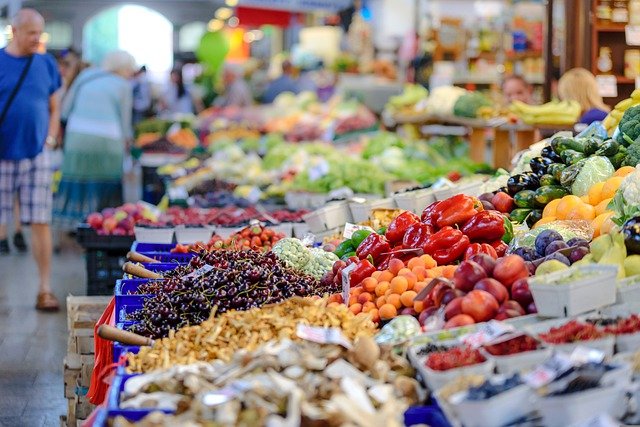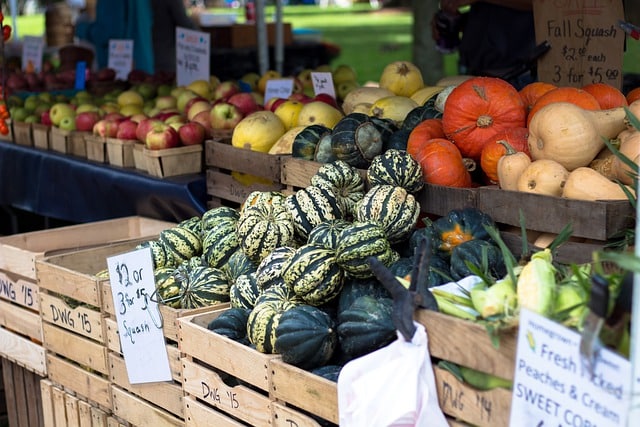Introduction – Prioritize to Maximize Value at a Farmers’ Market
A Farmers’ market is where people can buy fresh fruits, vegetables, and other goods directly from local farmers. It is a great place to find healthy and affordable food. A Farmers market shopping list is a great way to save money and eat healthily. It’s also a great way to cut down on long distance food-related carbon emissions. Instead of getting fruit from another continent, why not get it locally to eliminate the carbon cost of transportation? Food, home energy and travel are the big three sources of carbon emissions.
At the farmers’ market, you will mostly find locally grown produce. You can also find artisanal bread, cheeses, meats, and more at the market. Farmers’ markets are typically held weekly in town or city squares. Check the schedule before you go to know when the market is open. When you’re at the market, take some time to talk to the farmers. They can tell you about their farming practices and what goes into growing their food. The farmers’ market is a great way to support local agriculture and access healthy food.

Farmers’ Market Shopping List
When you go to the farmers market, you must have a list to know what you need to buy. This will help you save money and time. Here is a list of items that you can typically find at the farmers’ market:
1. Fruits and vegetables – Always try to buy seasonal produce grown locally. This ensures that the food is fresh and has the maximum nutritional value.
2. Meat and poultry – Even if you prefer organic, grass-fed, and free-range products, it’s best to get them from the farm. The animals are raised in a more natural setting without hormones or antibiotics.
3. Dairy products – Try to purchase raw milk, cheese, and yogurt from the farmers’ market. These products are made from milk that has not been pasteurized or homogenized, meaning they retain all their nutrients.
4. Eggs – Try buying eggs from free-range chickens at the farmers’ market. The chickens are not confined to cages and have unrestricted access to fresh air and light, resulting in better eggs.
5. Bread and baked goods – I love to buy freshly baked bread and pastries from the farmers’ market. The bread is usually made with whole grains and contains no artificial preservatives or additives.
6. Honey – Purchase local honey from the farmers’ market if possible. This honey hasn’t been subjected to the same treatment as store-bought honey, so it retains all its health benefits.
7. Coffee and tea – It’s a fantastic idea to buy roasted coffee beans and loose-leaf tea from the farmers’ market. Because these items have not been subjected to the same harsh chemicals as traditional coffee, they retain their full flavor and fragrance.
8. Nuts and seeds – You may be certain of their purity when purchasing nuts and seeds from the farmers’ market. These goods are generally fresher and less processed than those sold in shops.
9. Herbs and spices – Fresh herbs and spices from the farmers’ market are an excellent choice. These goods are generally more powerful and fragrant than those sitting on store shelves for months.
10. Local fruits and vegetables – Buying seasonal fruits and vegetables grown locally guarantees freshness and helps out the farmers in your community.
You can put any items on the list, but I like to buy these things from the farmers’ market. When you’re at the market, take some time to explore and talk to the farmers. They can give you great tips on how to prepare their food.
Farmers’ Market Shopping Tips
Before you go to the farmers market, there are a few things that you should keep in mind. These tips will help you make the most of your shopping trip.
- Start by listing what you want to buy at the farmers’ market. This will help you save time and money. Keeping a list will also help you remember to buy everything you need.
- Try to go early in the morning, if possible. The market is usually less crowded, and the farmers are typically more rested and able to answer any questions you may have. Be prepared to haggle with vendors over prices because they expect it.
- Choose fruits and vegetables that are in season because they will taste better and be less expensive. Seasonal produce is also more likely to be locally grown, which supports your community. Ask the farmers about their methods if you want specific products, such as organic or grass-fed meat. This way, you can ensure you’re getting what you want.
- It’s also a good idea to bring your bags to the farmers’ market. This will reduce waste and help the environment. Many markets now offer reusable bags for sale, so you can purchase one if you forget to bring your own.
- Talk to the farmers! They are a wealth of knowledge about their food and how it was grown or raised. The farmers can also give you great tips on preparing their food. Ask questions about how the food was grown or raised because they are the experts!
- Finally, enjoy yourself! The farmers market is a great place to find fresh, local food. It’s also a great place to meet new people and learn about different types of food. Have fun and savor the experience.
With these tips in mind, you’re ready to head to the farmers market and start shopping. Remember to take time, enjoy yourself, and talk to the farmers. They can provide you with a wealth of information about their food.

How Do You Negotiate At A Farmers Market?
When you’re at the farmers market, take some time to explore and talk to the farmers. They can give you great tips on how to prepare their food. You can also haggle with vendors over prices because they expect it. The best time for haggling is the end of the day when they are trying to get rid of produce. Remember to do this with respect and a smile on your face. Most farmers don’t want to see their perfectly good fruits and vegetables go to waste.
How Can I Save Money At A Farmers Market?
You can do a few things to save money at a farmers market. One is to bring your bags or boxes to carry your produce home in rather than buying them from the market. This will help you avoid spending extra money on something that you can get for free elsewhere. Additionally, plan your meals around what’s being offered at the farmers market that week rather than buying ingredients separately. This will help you save money on groceries overall.
Wrapping Up
In conclusion, the farmers’ market is a great place to buy fresh, local food. It’s important to make a list before you go so you don’t forget anything. Once you’re at the market, browse and talk to the farmers. They can answer any questions that you have about their food. Finally, don’t forget to haggle with vendors over prices—it’s expected! With these tips in mind, you will have a great farmer market experience.
